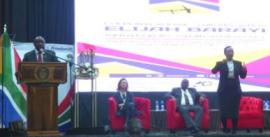
President Cyril Ramaphosa says the legacy of unionists and anti-apartheid struggle heroes like Elijah Barayi can be found in the labour-related laws enshrined in South Africa’s Constitution.
The President was delivering the inaugural memorial lecture for Barayi held at the University of Johannesburg’s Soweto Campus on Wednesday.
Barayi was a revered trade union leader and freedom fighter during the apartheid era and was one of the founding leaders of the National Union of Mineworkers (NUM).
He became first President of the Congress of South African Trade Union (Cosatu) at its launch in 1985 and was an activist in the Mass Democratic Movement since the 1950s.
His life was lived fighting for the freedom of South Africans and fair labour practises until his passing months before South Africa’s first democratic elections in 1994.
“Thirty years into democracy, we have several progressive labour and social protection laws, including the right to strike. And it was the labour movement as led by Barayi which insisted that the most fundamental right that workers should have should be collective bargaining, the right to strike, the right to have a safe working place.
“So for them to be enshrined in the Constitution is something that we need to pay tribute to Elijah Barayi and the leadership of Cosatu and various other worker organisations at the time. And it is in honour of Elijah Barayi that today we have these rights enshrined in our Constitution.
“We have the Labour Relations Act and the Basic Conditions of Employment Act to protect and advance workers’ rights. We have laws to safeguard the health and safety of workers and a Compensation Fund to support workers who are injured or sick. These achievements form part of the legacy of Elijah Barayi. They need to be protected and advanced,” President Ramaphosa said.
President Ramaphosa emphasised that these “hard-won rights” and many others must not be rolled back.
“There are some in our country who are calling for hard-won rights … like collective bargaining, to be curtailed and for the minimum wage to be scrapped. Trade unions need to be stronger to make sure that that never happens in South Africa because it will be a total reversal of what workers have achieved and what Elijah Barayi struggled for,” he said.
The future of work
President Ramaphosa reflected that “technological advances and globalisation” are changing the labour landscape and added that in order to keep up, innovation and entrepreneurship will be crucial and this “while safeguarding workers' rights and promoting social dialogue”.
“We need to invest in technology, infrastructure and education to enable sustainable and inclusive economic growth and job creation. At the same time, we must strive to democratise the governance of work.
“In South Africa, this means strengthening and adapting labour laws, institutions and regulatory frameworks to protect workers’ rights, promote fair competition and ensure social justice.
“We need to build a more inclusive and resilient labour market that will support a just transition, greater digitalisation and other drivers of change,” he said.
The President acknowledged that although policies implemented since the dawn of democracy have “lifted millions out of poverty and despair and improved their material condition”, many other South Africans are still living difficult and challenging lives.
“As long as the divisions in our society persist, as long as some people lead lives of quality and dignity whilst others suffer at the margins of the economy, our mission remains unfulfilled. We owe it to the memory of Elijah Barayi, to the South African people and to the generations to follow that we continue to work to overcome this inequality.
“Let us honour the memory of giants like Elijah Barayi by renewing our commitment to building a better, stronger South Africa.
“As we draw inspiration from the life and times of the man we honour here today, let us deepen our resolve to advance freedom and social justice everywhere – leaving no-one behind,” President Ramaphosa concluded. – SAnews.gov.za


